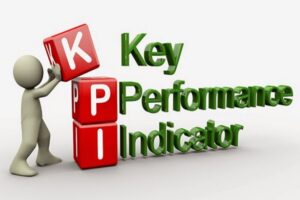KPI – Key Performance Indicator means job performance metrics – used to measure performance against key business objectives.
What are KPIs?
KPI – Key Performance Indicator means job performance metrics – used to measure performance against key business objectives.
Performance Index (KPI) is a measure to show how effectively a company is achieving through key business objectives. Organizations use KPIs at many levels to measure their success in achieving goals. High-level KPIs can focus on the overall performance of the business, while low-level KPIs can focus on processes in departments like sales, marketing, or call centers.
How to have an effective KPI?
A KPI is valuable when it is inspiring. Too often, organizations blindly adopt a KPI, stereotyped by another company and then wonder why that KPI doesn't reflect their business properly and doesn't affect or make any changes. what positive. One of the most important, yet often overlooked aspects of KPIs is that they are also a form of communication. As such, they follow the same rules and operations as communication. KPIs need to be quiet, clear, and relevant, so they are more likely to be absorbed and acted upon.
In developing a strategy for building KPIs, your team should start with the basics and understand what your organization's goals are, how you plan to achieve them, and who can act on the information. this. This should be an iterative process involving feedback from analysts, department heads, and managers. As this fact-finding quest unfolds, you'll gain a better understanding of which business processes need to be measured by KPIs and with whom that information should be shared.
Using SMART criteria in KPI

One way to gauge the relevance of a KPI is to use SMART criteria. KPIs must be specific (Specific) , measurable (Measurable), can reach (Attainable), related (Relevant), binding time(Time-bound). In other words, can you answer the following 5 questions:
Are your goals specific?
Can you measure progress toward that goal?
Is the goal realistic, achievable?
Is it relevant to your organization's overall goals?
When is the timeframe set to achieve this goal?
How to define KPI
Determining KPIs can be a complicated affair. The key word in KPI is “key” (key) because every KPI should relate to a specific business outcome. KPIs are often confused with business metrics. KPIs need to be defined against key business objectives. To define KPIs, the following steps can be followed:
- What is your desired outcome?
- Why is this result important?
- How do you measure progress?
- What can you do to influence the outcome?
- Who will be responsible for the business results?
- How do you know you have achieved results?
- How often will you evaluate progress on results?
Eg: Let's say your goal is to increase sales this year. You will call this KPI your sales growth KPI. Here's how you can define this KPI:
- Increase sales revenue to 20% this year.
- Achieving this goal will allow the business to be profitable.
- Progress will be measured as increased revenue and investment costs.
- Get existing customers to buy more products by hiring additional salespeople and promoting promotion.
- The sales manager will be responsible for these metrics.
- This year's revenue targets to increase by 20%.
- KPIs will be reviewed monthly.
KPIs can become more SMARTER
The SMART criteria can also be extended to SMARTER with the addition of evaluations and reevaluations. These two steps are extremely important, as they ensure you are continuously evaluating your KPIs and their relevance to your business. For example, if you've exceeded your revenue target for the current year, you should determine if it's because you set your target too low, or it can be attributed to some other factor.
Are the KPIs still relevant?
Building KPI systems often has a negative side to them. Unfortunately, many businesses are starting to think that managing KPIs is an outdated activity. This is because the KPI System also succumbs to one problem: lack of communication.
The truth is System KPIs are only valuable when you implement them. The KPI system requires time, effort and employee engagement to achieve expectations. Bernard Marr, bestselling author and business performance expert, sparks a rather interesting conversation on the subject, “What the hell is a KPI SYSTEM?”. The comments make it clear that when KPI Systems seem outdated (depending on who you ask), their hidden value remains in the hands of the people who use them.
The source: According to Brandvietnam























